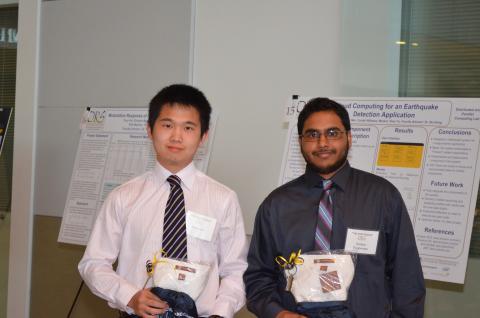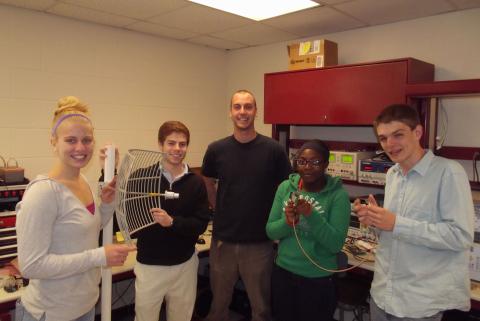On April 16, the Opportunity Research Scholar’s (ORS) Program held its 12th annual Undergraduate Research Awards Program. The event showcased the research projects of the 20 undergraduate student teams for the 2014 academic year.
On April 16, the Opportunity Research Scholar’s (ORS) Program held its 12th annual Undergraduate Research Awards Program. The event showcased the research projects of the 20 undergraduate student teams for the 2014 academic year. The ORS Program is an academic enrichment program in the School of Electrical and Computer Engineering that promotes student retention and academic performance through an extended undergraduate research experience.
The event was hosted by Jill Auerbach, director of ORS and the Office of Undergraduate Research in ECE, and Steven McLaughlin, Steve W. Chaddick School Chair.
Prior to the event, ORS teams were judged by panels of ECE faculty members who scored their work based on research knowledge, research quality, and presentation skills. This year, first place went to the team consisting of Damilola Apatira, Kevin Berman, Shad Hepner, and Olivia Wasdin. The team was mentored by Ph.D. student Blake Marshall and advised by Dr. Greg Durgin. Their project was titled “5.8 GHz Energy Harvesting Circuitry Matching for Variable Loads.”
The second place team, Sinan Liu and Sridhar Sivapurapu, was mentored by Ph.D. student David Zhang and advised by Dr. Madhavan Swaminathan. They won for their research that was titled “Improving the Signal Integrity in High Speed Circuits.”
Read more about the winning research projects:
5.8 GHz Energy Harvesting Circuitry Matching for Variable Loads
Radio frequency-to-direct current (RF-to-DC) energy harvesting efficiency degrades when impedance mismatch between rectennas and DC loads occur. Low-power microcontrollers are used with RF-to-DC energy harvesters for sensing applications and backscatter communications, but the microcontroller's impedance can vary, which results in reduced efficiency of energy harvesting circuitry. This research proposes a 5.8 GHz energy harvesting circuit that matches itself to a variable load by implementing a single control line from the microcontroller to an RF switch to increase energy conversion efficiency.
Improving the Signal Integrity in High Speed Circuits
A major flaw with the power plane design of printed circuit boards (PCBs) is that there are return path discontinuities (RPDs). These discontinuities result in loss of signal integrity within the PCB. This project's main goal is to improve the signal integrity of a PCB through investigation of various power transmission line board designs and the components used.
Additional Images

